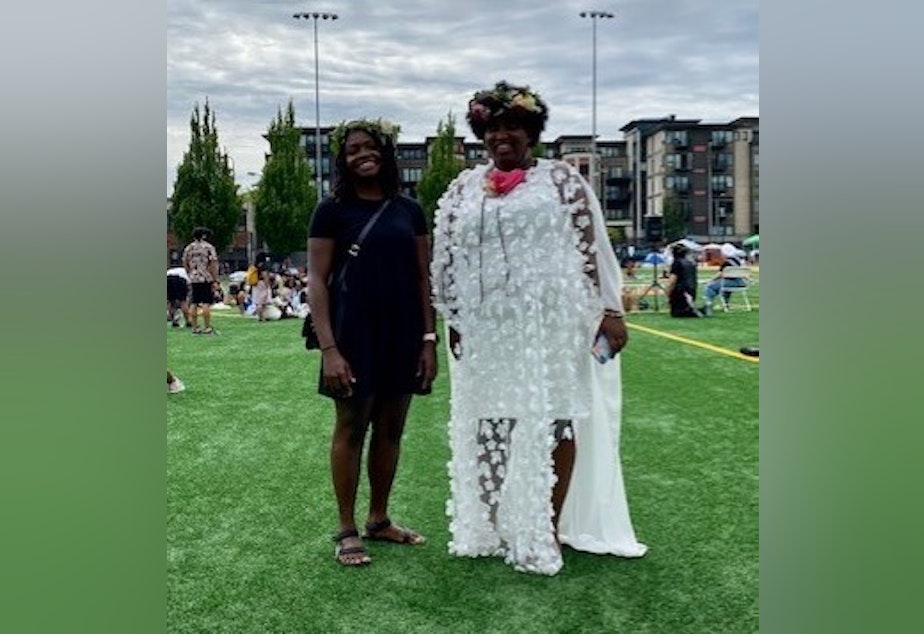A safe space for Black people to center on healing and joy on Juneteenth

It's Juneteenth today, also known as Freedom Day or Emancipation Day. It's the day Black people created to mark the end of slavery, and celebrate their freedom.
Today at the Capitol Hill Organized Protest, an all-day event is centering on black healing and community. There have been yoga sessions, grief circles and discussions of viral Black death and trauma. Mary Hall-Williams is one of the organizers. We reached her at the event.
This interview has been edited for clarity.
Mary, as you've described it, this all-day event is all about Black healing and community. You have asked non-Black allies to form a physical barrier of protection around the participants. Tell us about that, and why you felt that was necessary.
The reason why I think that is absolutely necessary is because a lot of the times when non-Black allies have questions they want to understand why we need Black spaces. They want to understand what's happening. They feel left out. They feel like they're not seen or they're not heard.
You have black people putting in a significant amount of emotional labor, in order to educate, and explain, and to prioritize other people's feelings, and to listen. We do that our whole lives as Black people, all the time to keep the peace.
Today, we wanted Black people to be able to rest, and to take a break from that. So, we asked allies to step in and play a de-escalation role on our perimeter. That means that when a non-Black ally comes and says “I don't understand why you're having this space. I feel left out. That's not okay.’ they have been trained to de-escalate and educate and say “This is why we're doing this. This is what it's about, and Black people doing yoga is not a threat to you.”
Sponsored
I understand you just started organizing this event on Tuesday. What has it been like trying to pull it together?
It's been overwhelming. I think that when you organize an event, people make a lot of assumptions. They say you must be someone in the community. You're an activist. You're an organizer.
I'm a university student. I'm a Black person who's committed to thriving, and who loves Black people. I'm a person who has not engaged on social media very much. If more than five people text me in one day, I write it on my planner to respond. And, I'm a high introvert.
So, it's been an experience on all levels. When I posted the open letter to talk about wanting to see Black people here, and about wanting us to center healing and joy, and to create forums for Black people to express their grief in safe spaces together without the threat of someone who simply doesn't understand, I didn't even know that it would resonate as greatly as it did.
I didn't know that people would start sharing it. I didn't know that people would come in and say that they're crying because they feel the same way and they want this space, they need this space.
Sponsored
Mary, there's a lot of energy, high emotion, a lot of pain and calls for change right now during this Juneteenth. I'm wondering how this year's marking of that day compares to previous ones for you.
I think this is the first year that I felt absolutely validated to take the day. I think there are several components to that. For one, I learned about Juneteenth through the Black community. I didn't learn about Juneteenth because I learned it in a classroom. There are certain things that people don't teach you.
It's not a national holiday, so most of the time I've been working on June 19. It's like, free-ish, you say, almost free. We hope to get to that point where we can take this day off and celebrate Blackness. Or, it's smaller community gatherings in specific places, in South Seattle where the Black community comes together, and it's not such a heightened political state. There's a way that it has a little bit more anonymity, because people didn't know about Juneteenth.
This year is the year that, one, I felt validated like, I'm going to take Juneteenth off, and spend it with other Black people celebrating the fact that I'm free and I'm alive and I deserve to thrive. Then, there's also the way that the socio-political state makes things a little bit more challenging to be out in the open, because now people know.
And we're also doing it in a space that is been reclaimed by a community of people, that is still figuring out what that is. You know, revolution is very messy.
Sponsored
What are you hoping people are going to be taking away from the events that you've got planned for today?
I hope they'll take away some audacity. And I hope that they'll take away the fact that there is a Black community in Seattle, and that we are dedicated to thriving, and that we care about them, and that we're willing to build community, and to really rally around each other, and that we're concerned with healing.
Mary, I wish you a safe day. Thank you so much for your time spending it with us today.
Thank you for talking with me.
Mary Hall Williams is an organizer of today's Black Out CHOP event. She's a student in the University of Washington's Department of Anthropology.
A group of Washington state representatives put forward a bill earlier this year to make Juneteenth a legal holiday here. It did not make it out of committee. Activists are calling for a federal Juneteenth holiday.
Sponsored
Listen to the interview by clicking the play button above.



